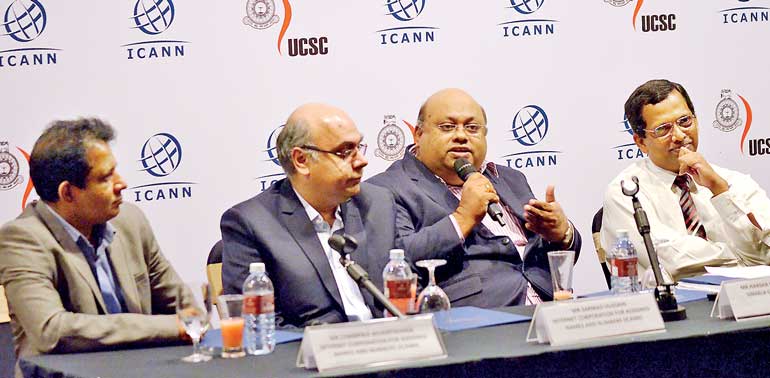Monday Feb 16, 2026
Monday Feb 16, 2026
Thursday, 21 December 2017 00:00 - - {{hitsCtrl.values.hits}}
 Head table from left: ICANN Security, Stability and Resiliency Regional Manager Champika Wijayatunga, ICANN IDN Programs Director Sarmad Hussain, Co-Chair of Sinhala Generation Panel Harsha Wijayawardhana, ICTA Program Director/Legal Advisor Jayantha Fernando
Head table from left: ICANN Security, Stability and Resiliency Regional Manager Champika Wijayatunga, ICANN IDN Programs Director Sarmad Hussain, Co-Chair of Sinhala Generation Panel Harsha Wijayawardhana, ICTA Program Director/Legal Advisor Jayantha Fernando
By Chathuri Dissanayake
In a bid to accessibility of internet and related technology for Sri Lankans, the Internet Corporation for Assigned Names and Numbers (ICANN) last week launched the Sinhala General Panel to commenced work enabling usage of domain names and access content in language.
The move will enable the local community contribute towards developing secure and stable access to the Internet in Sinhala.
Although Sri Lanka was one of the first to obtain top level domain names in both Sinhala and Tamil, lack of awareness and misconception has limited its usage, while lack of set standard has also been restricting.
“International Domain Names are domain names represented by letters or characters from different scripts and writing systems. They offer the possibility of using the domain names in languages across the globe, including Sinhala, Tamil, Thai, Chinese, Hindi, and others. Thus, providing a truly multilingual Internet with greater flexibility and opportunities for billions of users,” said Sarmad Hussain, ICANN’s IDN Programs Director.
“The ability for Internet users to come online in their native languages and scripts is a significant development for the Internet. As Sinhala is a commonly used language in Sri Lanka, the work by the Sinhala GP will lay the groundwork for allowing complete domain names in the Sinhalese language.”
The move is expected to boost Sri Lanka’s current Internet penetration rate of approximately 32%, which is below the average penetration of 46.7% in Asia 1, ICANN’s Security, Stability and Resiliency Regional Manager Champika Wijayatunga said.
The Sinhala GP comprises two Co-Chairs and a number of local community representatives from the policy, linguistic fields, as well as members with technical expertise in Sinhala language computing, Unicode and the Internet’s domain name system.
Although standards for Tamil language has been developed thanks to advancements in India, but Sinhala a language used only in Sri Lanka has not seen such advancements.
“The Sinhala GP will work on developing root zone label generation rules for the Sinhala script. There will be significant technical work involved, such as developing the rules for computers to understand how to form correct top-level domain names in Sinhala script. Our efforts will help to form the basis for allowing complete domain names in the Sinhala language,” Co-Chair of the Sinhala GP Harsha Wijayawardhana said.
Earlier this week, members of the Sinhala GP attended a workshop to discuss the work plan and next steps. The Neo-Brahmi GP is also in Colombo this week. They are developing label generation rules for nine Neo-Brahmi scripts including Tamil, the other commonly used language in Sri Lanka. When both the Sinhala and Neo-Brahmi GPs’ work are completed, Sri Lankans can look forward to accessing the Internet’s domain name system using domain names in their scripts and languages.
Work has been completed by the respective GPs for the Arabic, Armenian, Cyrillic, Ethiopic, Georgian, Khmer, Lao and Thai scripts, and is underway for many more, including Chinese, Japanese, Greek, Korean, and Latin scripts. ICANN is currently calling for volunteers to form GPs for these four scripts: Hebrew, Myanmar, Tibetan and Thaana.